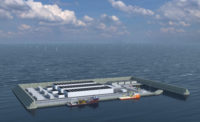The U.S. Energy Dept. said June 12 it would move forward to build a flagship clean-coal power plant in a small Illinois town, reversing a previous Bush administration decision to scrap the ambitious FutureGen project entirely in favor of smaller carbon-capture and storage projects (CCS) around the country.
Energy Secretary Steven Chu and his industry partner, the FutureGen Industrial Alliance, a group of 20 leading power utilities and coal companies, reached agreement on the project, a 275-MW integrated gasification combined cycle power plant that could cost between $1.3 billion and $1.8 billion.
The plant, to be sited in Mattoon, Ill., about 180 miles south of Chicago, will be the first commercial-scale, coal-fired power plant to capture its carbon dioxide emissions and permanently store them in underground geological formations. “Not only does this research have the potential to reduce harmful greenhouse gas emissions in the U.S., but it also could eventually result in lower emissions around the world,” Chu said, alluding to opportunities to sell the technology to China and other big coal-using countries.
The Bush administration early last year abandoned plans to build FutureGen at Mattoon, citing huge budget overruns and a cost-sharing structure it said was skewed in the alliance's favor. Instead, it focused efforts on partnering with industry to build an array of smaller CCS projects.
But the Bush team never awarded any funds for that approach, which gave the Obama administration an opportunity to put FutureGen back on its original track and to kill the multi-site Bush plan. The alliance lobbied the administration and Congress heavily for the project.
A House panel in March found that the Bush administration was "never fully committed to the FutureGen project or its goal of developing technology" based on how easily it dropped the program.
Officials in DOE's fossil energy wanted to move forward, and argued that industry would never take on the costs of building the first generation of plants because of the costs. Career DOE officials estimated that "it is reasonable to assume that without FutureGen, the availability of moderate-cost, coal-fueled CCS plants would be delayed by 10-15 years," according to a report from the House Science and Technology Committee.
FutureGen will be one of the highest-profile government-funded construction projects, since it will be using $1 billion in funds from the $787-billion economic stimulus bill that President Barack Obama signed earlier this year. Overall, the stimulus bill provided DOE with $3.4 billion for CCS projects.
The FutureGen alliance will contribute between $400 million and $600 million over the next four to six years as the plant is built, DOE said. Each member company will spend $20 million to $30 million annually. The text of the agreement, which was not made public, will result in a formal "Record of Decision" by the end of June.
Over the second half of 2009, DOE and the alliance will work on issues such as restarting preliminary design activities; an updated cost estimate; additional geological characterization; and exploring ways to use electricity sold to help pay for the lifetime cost of the project.
DOE said FutureGen will initially capture 60% of its emissions, ramping up to 90% by the last phase of the project. DOE also said that FutureGen "will be designed to gasify a single coal type," which represents a departure from the original plan to test all kinds of coal, including the high-sulfur bituminous coal found in the Illinois Basin.




